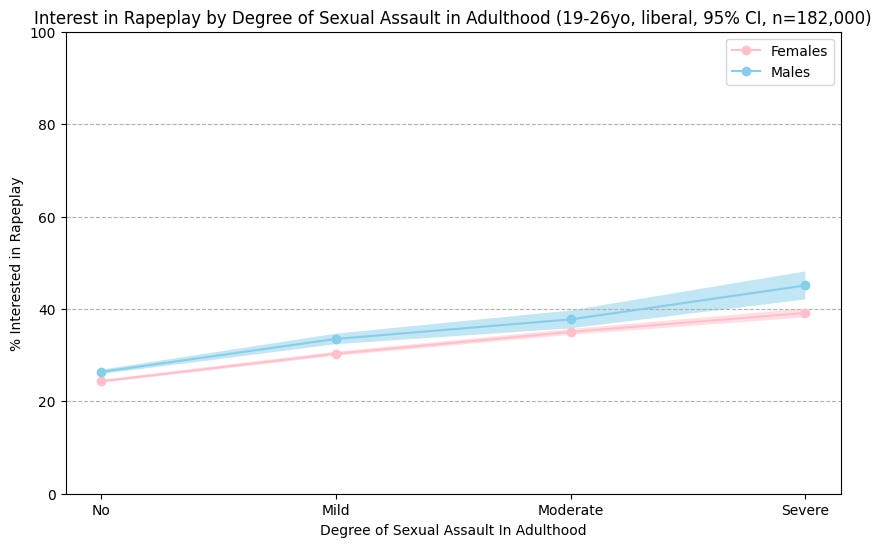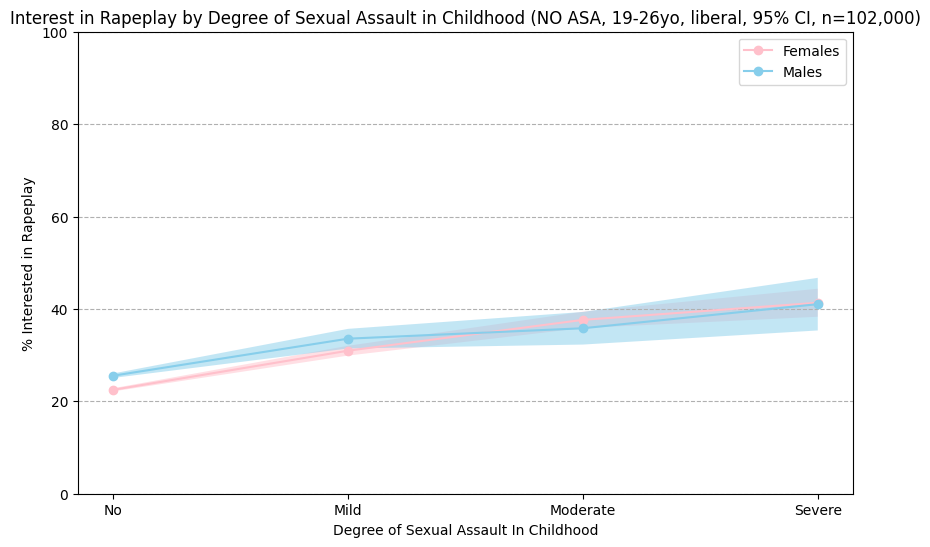Are sexual assault survivors more likely to have rape fetishes?
Survey results (spoiler: I was wrong)
I predicted no; when I skim over lists of correlations in my data, very little exists.
But I was wrong!
In one part of my Big Kink Survey I asked people to check a box indicating if they were sexually aroused by rapeplay; in another part of the survey I asked a few spectrum questions about sexual assault.
Cis people only:
Not-cis people only (people who reported being trans, nonbinary, or other):
The gap from “no” to “severe” here is 15% - comparatively to most things in my data, a massive effect.
(I’m checking young, liberal women here as a substitute for controlling, because they make up the majority of my data and I’m not confident in my ability to do regressions without fucking anything up. I’m occasionally spot-checking other demographics though, and it seems to be consistent; e.g. young conservative women have a 14% gap)
Okay, what about sexual assault during childhood?
This is even stronger, between “No” and “Severe” the gap is 20% for women and 19% for men.
But okay - assault in childhood and adulthood is really correlated. Maybe sexual assault in childhood is doing most of the correlative work here?
What happens when we look at the adult fetishes of women who weren’t sexually assaulted in childhood?
The gap shrinks here; for women “no” is at 22.5%; “severe” is at 29.7%", or 7 points.
Okay, let’s see sexual assault in childhood, but only including people who report no sexual assault as adults:
Yeah, it returns to big numbers - gap between “no” and “severe” for men here is 16%, and 19% for women.
This is where my concept of ‘correlations’ breaks down. I think this effect we’re seeing is real and meaningful - if someone tells you they were severely sexually assaulted as a child, we should increase our average guess of them being into rapeplay by 15-20%!
But the correlations here are negligible. For males it’s r=0.1, for females r=0.14; barely close to being worth reporting. I understand in principle how this works - the scatterplot spread is too broad or whatever - but still I feel some existential confusion about it. I don’t know how to conceive of correlations if they aren’t catching the trend in the graphs above.
Anyway. Does this matter at all for who did the assaulting?
Checking females who reported either ‘moderate’ or ‘severe’ childhood sexual assault (n=21k), here’s the % of the groups who reported interest in rapeplay, binned by who they say sexually assaulted them in childhood.
Mother: 49.8%
Father: 46.5%
Someone I didn’t know well: 43.0%
Sibling: 42.7%
Extended family/family friend: 41.3%
Keep in mind this option was a checkbox question, so people could select multiple.
Here’s the same list but for males. Males was only 3k, I’m lazy and not calculating CI here, just keep in mind sample size is lower.
Sibling: 49.2%
Father: 49.1%
Someone I didn’t know well: 44.2%
Extended family/family friend: 43.3%
Mother: 40.3% (only 144 people in this bin)
I am deeply confused by how the average value of ‘rapeplay’ for people who’ve been sexually assaulted in childhood is ~40%, but when I ask any subgroup of people who pick a specific person who assaulted them, it’s above 40%. I think this means people who didn’t select any specific offender, generally were less likely to select rapeplay?
I wonder to what degree this is a proxy for accuracy; it’s possible that people who didn’t select a specific offender, were less honest about being sexually assaulted, and thus regressed to more ‘normie’ rapeplay values? Unclear.
As a quick additional check, heres’ the gaps (from 0, ‘didn’t happen’ to 4 ‘very regularly happened’ in childhood) in % of people preferring rapeplay by various types of other abuse:
Females:
Verbal abuse by a woman: 25-39%
Verbal abuse by a man: 25-37%
Physical abuse by a woman: 26-42%
Physical abuse by a man: 26-42%
Neglect: 25-40%
Spanking: 27-36%
Males:
Verbal abuse by a woman: 24-38%
Verbal abuse by a man: 24-36%
Physical abuse by a woman: 25-38%
Physical abuse by a man: 25-38%
Neglect: 25-39%
Spanking: 26-32%
Oh damnit, since we’re here let’s quick glance at religion and ethnicity.
Smallest samples here were male native americans, n=180 or so, and male buddhists, n=204.
If you wanna see how the prediction markets thought about this before I published the results, here’s a market for childhood and the one for adulthood.












"This is where my concept of ‘correlations’ breaks down. I think this effect we’re seeing is real and meaningful ... . But the correlations here are negligible. "
It's a base rates issue. If A is rare and B is common, then A can't be strongly correlated with B even if A strictly implies B; most cases of B will have nothing to do with A.
For instance, imagine an adventurer's guild. Each member is either a fighter or a wizard, and either a human or an elf. Half the humans are fighters, and half the humans are wizards. All the elves are wizards. So conditional on being an elf, the likelihood of being a wizard is doubled. Intuitively that's a strong relationship. But what's the correlation between species and job? It depends on the ratio of elves to humans.
With 10 humans and 10 elves you get 10 elf wizards, 5 human wizards, and 5 human fighters. The job/species correlations is R = 0.58.
With 90 humans and 10 elves you get 10 elf wizards, 45 human wizards, and 45 human fighters. Now the job/species correlation is only R=0.3. With 990 humans and 10 elves, the correlation drops to R=0.1.
Basically, even though knowing someone is an elf tells you a lot about their job, if elves are very rare then knowing who the elves are doesn't help you much if you're trying to predict everyone's jobs.
Predictably, many people in the comments are interpreting "X is correlated with Y" as "X causes Y", not realizing that it could equally well be Y causing X, or some third thing causing both.
May be worth editing the title to "Are people with rape fetishes more likely to report being sexual assault survivors?" to try to ward off those people jumping to conclusions.